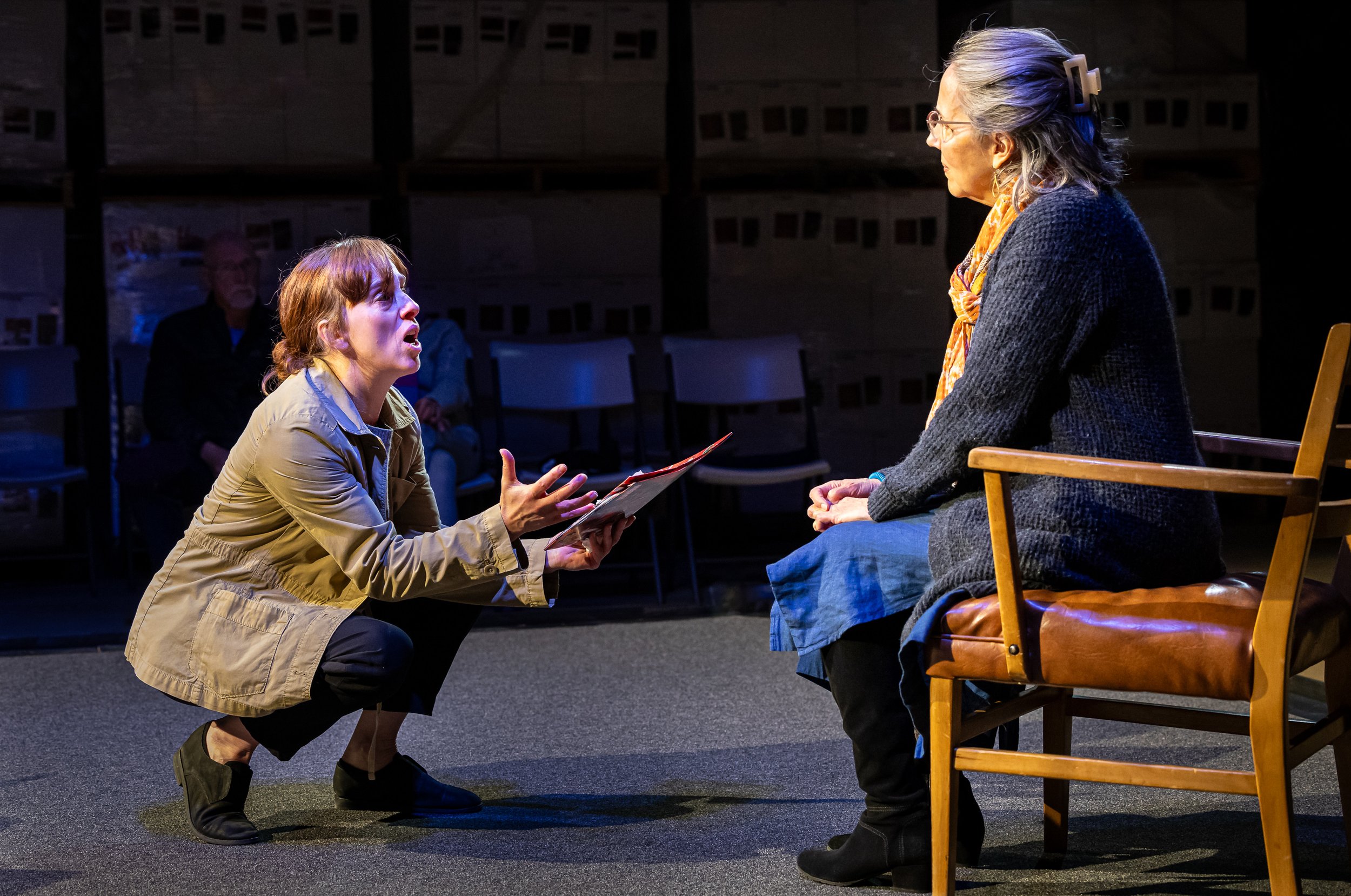Domenique Lozano, right, and Erica Sullivan act out a scene in Rogue Theater Company's production of "Gidion's Knot," in the Richard L. Hay Center at Grizzly Peak Winery. Bob Palermini
Gidion’s Knot explores the experiences of a mother, played by Erica Sullivan, left, and a teacher (Domenique Lozano) both coping with the unimaginable, and discovers the truth behind their shared grief over the mother’s son, Gidion. Bob Palermini
THEATER REVIEW: Gidion’s Knot delves into the heart of grief
By LUCIE K. SCHEUER for the Rogue Valley Times, November 1, 2024
On a recent podcast, respected CNN broadcaster Anderson Cooper engaged in a discussion with psychotherapist Francis Weller about the unrelenting grief he has been feeling around his father’s death decades ago.
Anderson: "I feel like I'm at a fork in the road, and this sadness resides just below the surface of my skin, and I hear its whispers in every sentence that I speak. What do I do about that?"
Weller: "Trust it. I mean, there's this insinuation that that's a problem and that it's wrong. Rather than saying something is happening to me, how do I collaborate with this? What is my soul insisting on here? Well, it's insisting on you returning to something that had been abandoned — had been neglected."
Anderson: "… Shouldn't I be over this?"
Weller: "To the boy, to your heart, to your soul, that time doesn't matter at all. It's grief that hasn't really fully been honored. There's a request from the soul, from grief that says we must honor these losses. If we don't, they really become like a sediment that settles on us and weighs us down."
This excerpt seemed oddly appropriate in striking at the heart of playwright Johnna Adams’ raw, disturbing, soul-wrenching, shocking play, "Gidion’s Knot," produced by Rogue Theater Company, now playing at the Richard Hay Center through Nov. 10. It is about grief that hasn’t been “really fully honored.” It's about the “sediment that weighs us down;” a story about a grief-stricken mother, Corryn, and her son’s teacher, Heather, trying to come to terms with Corryn’s son’s suicide.
Corryn is trying to get at the truth behind what provoked her son, Gidion to take his life, but leaving a trail of blame and vitriol in her wake. Meanwhile his teacher, Heather Clark, is trying to deflect and avoid it at all costs. The play showcases the mother and the teacher, face to face, not necessarily trying to get to The Truth — but to their own truths about how this happened.
Be warned: "Gidion’s Knot" does not fool around. It takes you into the heart of grief. The loss of innocence. Bullying. Abandonment. It contains references to physical and sexual abuse. The play also contains a horrific description of a massacre that forms in Gidion’s fifth-grader imagination, introduced as his class essay assignment. Corryn, a professor of ancient literature, says Gidion based the essay on a story she shared with him about two clans who meet on the battlefield in ancient Gaul. His mother sees her son’s essay as poetry, sheer genius. His teacher sees it as disturbed, and the reason for Gidion’s suspension from school prior to his death.
As diligently as this one tried, it is hard to forgive playwright Adams for taking us into Gidion’s warped, violent imagination in such vivid detail. It is true, in this author's opinion, that by exposing children to decades of the internet and gratuitously created video games, by not meeting their emotional needs, by failing to foster positive social interactions or modeling healthy relationships — society has failed these children. The problem is — none of this is addressed in the play. Instead, it tries to be esoteric and gets lost in its own vague allegorical references.
Domenique Lozano as Heather Clark and Erica Sullivan as Corryn Fell are superb. The dialog in this play requires a lot of restraint on Sullivan’s part and emoting on Lozano’s — which they negotiate well. There are long pauses between a series of confrontations that make up the core of the story. The pauses become as important as the dialog. Lozano and Sullivan understand the nuances.
The title "Gidion’s Knot" is based on a fable about Alexander the Great’s decision to simply slice through an intricately tied knot, a Gordian Knot, rather than unravel it. This is Gidion’s conundrum. How does he unravel these tortuous bundles of knots in his mind — about the death of his grandfather, about his awakening feelings for his friend Jake, about his awareness of sexual abuse, about his mother and her peculiar romance with medieval literature?
Terri McMahon’s direction, Jessica Sage’s artistic direction, and Michael Ganio’s scenic design have retained the high level of artistry one is used to experiencing with RTC. It’s the play itself that is called into question.
A fellow theater-goer asked, “Have we become so desensitized that we have to be exposed to graphic playwriting like this? How does this make things better?” These are excellent questions.
Playwright Adams says in an interview with writer Tina Howe: “My idea was that both the play’s characters are trying their best to do the right thing in a situation where there really isn’t a right thing that can be done.” A point well taken. Just not sure the story has to be driven home like a stake through Dracula’s heart.
If you or someone you know is struggling, there are many resources available to help. Call or text the Suicide and Crisis Lifeline at 988, or YouthLine, a teen crisis helpline, at 800-273-8255.
Reach Ashland-based writer Lucie K. Scheuer at LucieScheuer19@gmail.com.



